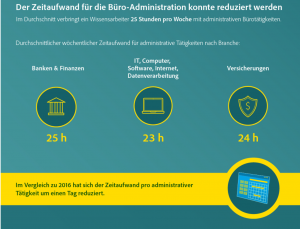
Old principle in new clothes – from sharing in the Sharing Economy
11. December 2018
Open Innovation – how companies can learn from successful companies in the digital transformation process
20. March 2019Vision and state of affairs
T he birds chirp in your garden, the mowing robot does its job quietly and the smell of freshly mown grass rises to your nose. The idea is to be fully occupied with the figures for the development of the new project, optimally networked with the colleagues via the tablet. While the call is still running, the digital assistant updates the to-do lists with the tasks discussed in the call. During the outdoor meeting, the lighting at the home workstation has automatically switched off and incoming calls are answered by a chatbot. When I say that I am quite tired, the coffee machine automatically starts up and prepares the preferred variety with a small sip of milk.
This is just an excerpt from the vision of mobile working, but it clearly shows that the workplace of the future is less in a closed office building, but rather where you feel comfortable. The technology is therefore becoming a constant companion, just as no one today questions the use of smartphones any more, and above all because it makes life more pleasant and comfortable.
Eliminate the basic problem of “administrative work
The dishwasher was developed to clean the dishes, the floor is cleaned by the suction robot and the heating system is efficiently controlled by an intelligent heat management system. All these processes have one thing in common: they are not creative, meaningful activities, but rather annoying tasks that the computer and its numerous helpers do for us.
What is already part of everyday life at home is still a source of anxiety in the office. There, too, no one has an increased desire to plan and apply for business trips or to fill out forms for this and that. Nevertheless, the workers spend a considerable part of their labour with office administration, which has only indirectly something to do with their actual activity. Technical helpers can also help to significantly reduce the time spent on office administration.

As the example shows, the average weekly effort can be significantly reduced by using supporting technology. The system supports the employees in the way that suits each individual best. Who needs which reminder and when? Which activities are left lying around and are lost sight of? Where can further solutions be offered? It is therefore much more than a single tool, for example, what makes project management efficient.
Reducing the administrative effort also means that a separate office workstation becomes less important. Surely there may be people in the future who feel most comfortable at their own desk, but many will prefer alternative places to work where they can be creative.
Digitisation does not destroy jobs, but enhances the value of work
The example of mobile work illustrates how valuable digital helpers can be. In the future, ideal time slots can already be defined when planning meetings without long coordination rounds preceding them. In project management, too, appropriate software can support agile processes, which has proven its worth especially in the dynamic development environment.
It is important that the digital transformation is not accompanied by corresponding cultural changes in the company. Companies must take their employees with them in the change processes and involve them from the outset. This means that the fears of many employees that their workplace would become negative through automated IT support can prove to be unfounded. For companies, it must be clear that a real agile optimization of complex business processes can only succeed in a combination of human experts and IT technology. If employees can concentrate more on solving critical problems and implementing corporate goals, the area of responsibility of many workplaces expands. The valuable manpower of the employees is used much more for value-creating (and thus also meaningful) activities.
In summary, two important components for the work of the future can be represented:
- Mobile work occurs when the employee is allowed to work at other, non-prescribed locations in addition to his workplace. The employee does not necessarily have to work from home. He only has to ensure his accessibility. Mobile work also exists when the employee works on business trips (mobile).
- Special Digital Workplace software aims to make collaboration and the exchange of information decentralized and cross-location. Digital Workplace means that every employee has personalised access to a company portal. There they can find all relevant information and digital work processes. Communication takes place via the company’s own collaboration applications. Knowledge is exchanged in virtual project groups. Teamwork can thus take place beyond departmental or local boundaries.
Where do you start tomorrow?
As an entrepreneur, talk to your employees first; they are your most valuable resource. Clarify exactly what your wishes and needs are in terms of mobile and flexible work and then select the tools you need on this basis – not the other way around!
Make your critically minded employees aware of the advantages and benefits of digitisation for their work. For example, they can save travel to work if they work elsewhere one or two days a week.
And most importantly, be a good role model as an entrepreneur! Don’t just talk about digitisation, but also exemplify it. This could start, for example, with not having documents printed out for the next meeting or dismantling the large file cabinets in your office and destroying the files after proper digitisation. Share your own personal successes in digitisation and inspire your employees to join in. The moment they recognize a benefit for themselves, the digital transformation becomes a self-runner.




